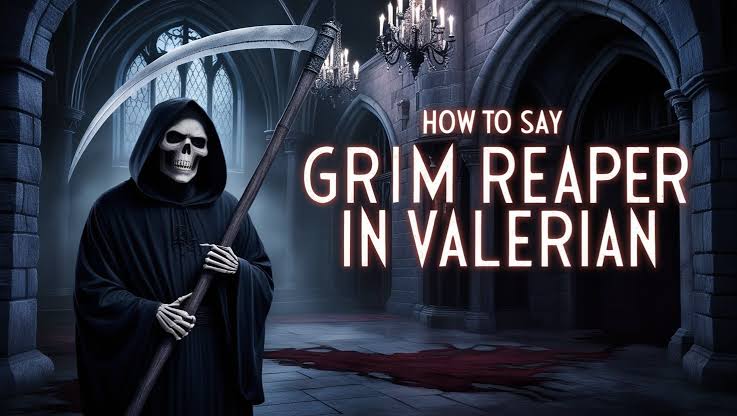If you’re a fan of Game of Thrones or House of the Dragon, you’ve probably been fascinated by the fictional languages used in these series. Valyrian, a language as rich and mysterious as the world it comes from, has intrigued many people. Today, we’re diving into something particularly dark and fascinating—how do you say “Grim Reaper” in Valyrian? Let’s explore!
Introduction: Valyrian and the Grim Reaper
Valyrian is a language that’s woven with history, magic, and mystery, making it one of the most captivating parts of George R. R. Martin’s world. The language has been crafted so carefully that many fans want to dive in and learn more about its words and meanings. One intriguing term that often piques the interest of Game of Thrones enthusiasts is the equivalent of the “Grim Reaper”—a symbol of death that carries significant meaning in many cultures.
In this blog post, we’ll take a closer look at what the Grim Reaper represents, how to say it in Valyrian, and what that might tell us about the culture and mythology of the Valyrian language. Let’s unravel this fascinating mystery together!
1. Understanding the Concept of the Grim Reaper
Before we jump into the translation, let’s clarify what the Grim Reaper actually symbolizes. The Grim Reaper is a personification of death, commonly depicted as a skeletal figure cloaked in black robes and wielding a scythe. This image has its roots in various mythologies and represents the inevitability of death, harvesting souls as part of the natural cycle of life.
But does the concept of the Grim Reaper directly translate into Valyrian? Given that Valyrian culture, much like our own, seems to have intricate beliefs around life, death, and the supernatural, it’s worth looking into how they might describe such a figure.
2. How to Say “Grim Reaper” in Valyrian
When we talk about translating something as specific as “Grim Reaper” into Valyrian, it’s important to understand that Valyrian, like many fictional languages, may not have an exact, one-to-one translation for every concept. However, we can piece together a phrase that fits the meaning based on what we know about the language.
In Valyrian, there isn’t a direct word for “Grim Reaper” as we understand it, but we can use a combination of terms that describe the “bringer of death.” A suitable phrase could be “Valzȳrys Ānogar”, which roughly translates to “Death Bringer” or “Bearer of Death.”
- Valzȳrys: This term refers to something or someone associated with death.
- Ānogar: This word could mean “bringer” or “carrier,” indicating a role or duty.
Therefore, “Valzȳrys Ānogar” effectively captures the essence of what the Grim Reaper represents—a being that carries or brings death.
3. The Symbolism Behind “Valzȳrys Ānogar”
In Valyrian culture, as reflected in the mythology presented in Game of Thrones, death is often linked with power, the unknown, and a certain kind of reverence. The phrase “Valzȳrys Ānogar” speaks to this relationship, hinting at a role that’s both feared and respected. Unlike the Western image of a skeletal figure, Valyrians may view the “Death Bringer” with a mix of awe and dread, fitting for a people so intertwined with magic and dragons.
4. How Valyrians View Death
In Valyrian culture, death doesn’t necessarily have the same grim finality as it does in many of our traditional stories. The connection with dragons, rebirth through fire, and the enduring legacy of Valyria speaks to a more nuanced relationship with death. The phrase “Valzȳrys Ānogar” could imply an ongoing cycle—much like the idea of rebirth that Targaryens are associated with.
The figure of death in Valyrian lore would likely be less about fear and more about destiny—an inevitable path that must be walked by all. Unlike the cold, impersonal Grim Reaper of Western mythology, a Valyrian Death Bringer might be seen as a necessary force, perhaps even one tied to magic.
5. Learning More Valyrian Phrases
If you’re interested in learning more about Valyrian, here are a few other phrases that might come in handy:
- Dracarys – “Dragonfire”: This is probably the most iconic Valyrian word, used to command dragons to unleash their fire.
- Valar Morghulis – “All Men Must Die”: A popular High Valyrian phrase that underlines the inevitability of death.
- Valar Dohaeris – “All Men Must Serve”: The response to “Valar Morghulis,” reflecting the balance of life and duty.
Conclusion
While Valyrian may not have a direct equivalent for “Grim Reaper,” the phrase “Valzȳrys Ānogar” serves as a fitting representation of a being that brings death. It gives us insight into how the Valyrians might have viewed death—not as something to be feared, but as a powerful force that is part of their magic-infused world.
The language of Valyrian is complex, poetic, and filled with meaning, much like the culture from which it originates. So, next time you think of the Grim Reaper, imagine instead the “Death Bringer” of Valyria—someone as mystical and formidable as the dragons themselves.
FAQs
1. Is Valyrian a real language?
No, Valyrian is a constructed language, created specifically for the Game of Thrones series by David J. Peterson. It has consistent grammar and vocabulary, making it learnable, but it’s not a natural language.
2. Can I learn Valyrian?
Yes, you can learn some basics of Valyrian! There are resources online, and even language courses that teach High Valyrian. Apps like Duolingo offer lessons to get you started.
3. What does “Valar Morghulis” mean?
“Valar Morghulis” is a popular Valyrian phrase meaning “All men must die.” It is often paired with “Valar Dohaeris” (“All men must serve”).
4. Is there a Valyrian word for “Grim Reaper”?
There is no exact Valyrian equivalent of “Grim Reaper,” but “Valzȳrys Ānogar” can be used to represent the concept of a death bringer.
5. What is the significance of death in Valyrian culture?
Death in Valyrian culture seems to be seen as an inevitable part of the cycle, much like in many mythologies. It ties closely with their understanding of power, destiny, and magic.
6. How accurate is the Valyrian language used in Game of Thrones?
The Valyrian language is well-constructed for a fictional language, with consistent rules and vocabulary. David J. Peterson, a professional linguist, developed it to be as realistic as possible.

